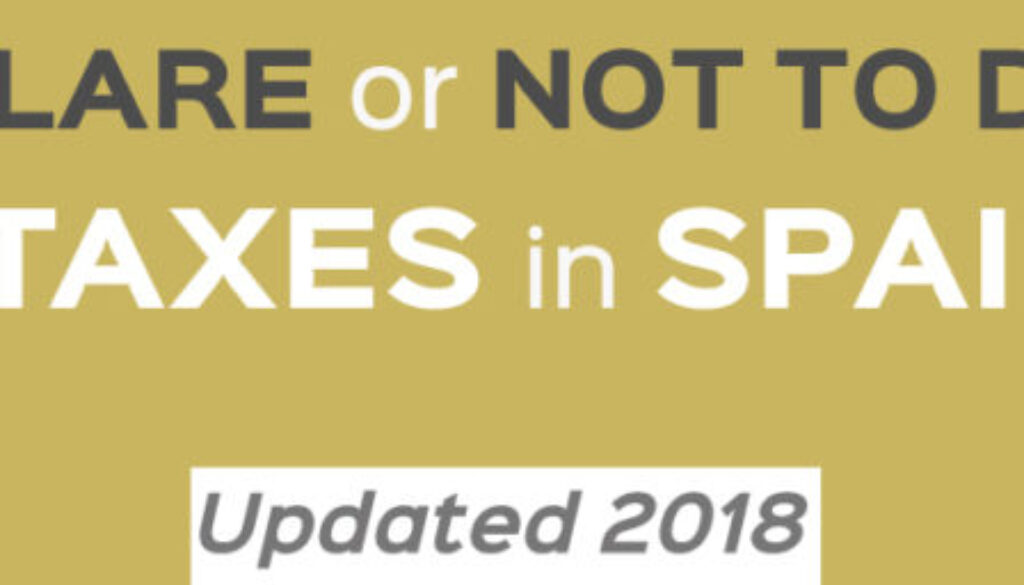Do I have to declare taxes in Spain?
CONTRIBUTORS WHO HAS TO DECLARE TAXES IN SPAIN
(Article 96 Income Tax Act)
In general, IRPF (Personal Income Tax) taxpayers are obliged to present and sign a declaration for this Tax, with the limits and conditions regularly established.
Before going deeper, we need to understand the following terminology:
– IPRF (Índice de Renta para las Personas Físicas): this is the average compiled from the interest rates of the mortgage loans contracted in one month by banking institutions.
– Payer (pagador): used as a combining form to mean a person who pays something. On tax matters, we consider a payer a person/company that pays you money.
– Integral profis of personal work: All income from work shall be considered as all the considerations or profits, whatever their denomination or nature, monetary or in kind, that derive, directly or indirectly, from personal work or from the labor or statutory relationship and do not have the character of returns of economic activities.
– Withholding tax base: the withholding tax base amount is the line item net amount.
Who has no obligation to submit annual tax returns in Spain?
Taxpayers have no obligation to declare taxes in Spain if they obtain incomes from the following sources exclusively, in individual or joint taxation:
1. Integral profis of personal work (including, among others, pensions and liabilities, as well as compensatory pensions and annuities for food) that do not exceed the following amounts:
- €22,000 euros per year if they come from a single payer
This same limit also applies when the income from work comes from more than one payer, if the sum of the amounts received from the second and remaining payers, in order of amount, do not exceed the sum of 1,500 euros per year.
The limit will also be 22,000 euros, in the case of taxpayers whose only income from work consists of the passive benefits referred to in article 17.2.a) and the determination of the applicable withholding rate would have been made in accordance with the special procedure established by regulation. To do this, the pensioner with two or more payers must have requested the determination of the type of withholding through model 146.
- €12,000 euros per year in the following cases:
– When they come from more than one payer (except for the exception provided in the previous point).
– When compensatory pensions are received from the spouse.
– When annuities are received for food that is not exempt (annuities for food received from parents by virtue of judicial decision are exempt).
– When the payer of the income from work is not obliged to retain in accordance with the provisions of the regulations (article 76 RGL. IRPF).
– When full income from work is received at the fixed rate of retention of article 80.1. 3rd and 4th of the Tax regulation.
2. Integral profid of movable capital (dividends from shares, interest on accounts, deposits or fixed income securities, etc.) and capital gains (profits derived from reimbursements of shares in Investment Funds, prizes for participation in contests or games, etc.), subject to withholding or deposit on account, with the joint limit of €1,600 per year.
3. When withholding tax base has not been determined based on the amount to be included in the taxable base, the capital gain obtained from transfers or reimbursements of shares of collective investment institutions can not be attributed as a capital gain subject to withholding or income. account for the purposes of the exclusionary limits of the obligation to declare.
4. Imputed real estate income, intact income from movable capital not subject to retention derived from Treasury Bills and subsidies for the purchase of officially protected housing or appraised price, with the joint limit of €1,000 per year.
When the taxpayer has not been the owner of the real estate that generates imputed real estate income during the whole year (due to having acquired or transmitted it in that year), the cadastral value (or, failing that, the acquisition value) will be prorated to these effects depending on the number of days of the year during which the taxpayer was the holder of the same.
Exception to the obligation to declare
In no case, taxpayers who obtain exclusively full income from work, capital or economic activities, as well as capital gains, with the joint limit of €1,000 per year and patrimonial losses of less than €500 are obliged to declare (except for the purposes of the provisions of the following section).
Obligation to declare if certain deductions or reductions are practiced
The taxpayers who are entitled to apply the following deductions or reductions are obliged to declare in any case, when they exercise that right:
- Contributions to protected assets of persons with disabilities, pension plans, insured pension plans or social security mutual funds, corporate social security plans and dependency insurance that reduce the tax base.
- Deduction for investment in housing (Régimen transitorio or Transitional Regime)
- Deduction for international double taxation.
- Obtaining other types of income:
Taxpayers who receive any other type of income or exceed the maximum amounts or limits indicated are required to declare in any case.
- Exempt income:
Tax-exempt income (such as, for example, Social Security pensions for absolute permanent disability or severe disability, public scholarships to study, annuities for food received from parents by judicial decision) will not be taken into consideration.
- Joint taxation:
None of the amounts or limits indicated above will be increased or extended in case of joint taxation of family units.







Maximilian
April 18, 2024 @ 9:41 am
Hello,
I have been living in Spain since January 2023, and my yearly gross salary is 17000. Am I obliged to submit a Personal Income Tax Return in my case?
In case yes, do you usually provide services with this?
Javier Rodríguez
April 18, 2024 @ 2:09 pm
Hello Maximilian,
If that salary is just coming from a single employer, you are not obliged to submit your Personal Income Tax Return in Spain.
Kind Regards,
Javier R.
Daryl
November 11, 2018 @ 3:06 pm
Hi Javier,
I am a recidencial landlord in England and make some €45,000 in profit. I am looking to live in Spain. Do I have to declare and pay Spanish taxes once UK taxes have been deducted?
Javier Rodríguez
November 12, 2018 @ 2:58 pm
Hello,
If you are a registered as a resident in Spain and your incomes are over €22,000 per year (right into your Spanish bank account/s, to be more exact), you should declare your taxes in Spain, regardless of the UK deductions. In such a case, you may need to fill in some forms in order to avoid a double taxation.
John
September 4, 2018 @ 8:21 pm
Hi Javier,
I earn more than €22,000 per year in my home country Ireland which has a double taxation treaty with Spain. If I declare my income when I apply for a NIE does this mean I will still be double taxed even though this treaty is in place?
I want to work remotely in Spain but my home office is in Ireland. I pay taxes fully in Ireland and travel quite a lot so I will be out of Spain for a good part of the year but still in Spain more than 183 days more than likely.
Javier Rodríguez
September 5, 2018 @ 1:02 am
Hello John,
I can see some confunsion. Applying for a NIE means you are NOT a tax resident. So you may mean RESIDENCY. In that case, you need to declare your taxes at the country where you get this money from (Ireland) and get this money in an Irish bank account. If so, you will not need to declare them in Spain.
However, according to the Spanish laws, actually you should declare your incomes over 21600€/year, so if you get your pension DIRECTLY in a Spanish bank account, the Spanish Tax office may fine you and ask you to pay some taxes from that day.
In summary, I find unfair that the Spanish Tax office wants to charge a foreign pension, but this will just work you resident in Spain and get your pension directly in a Spanish bank account.